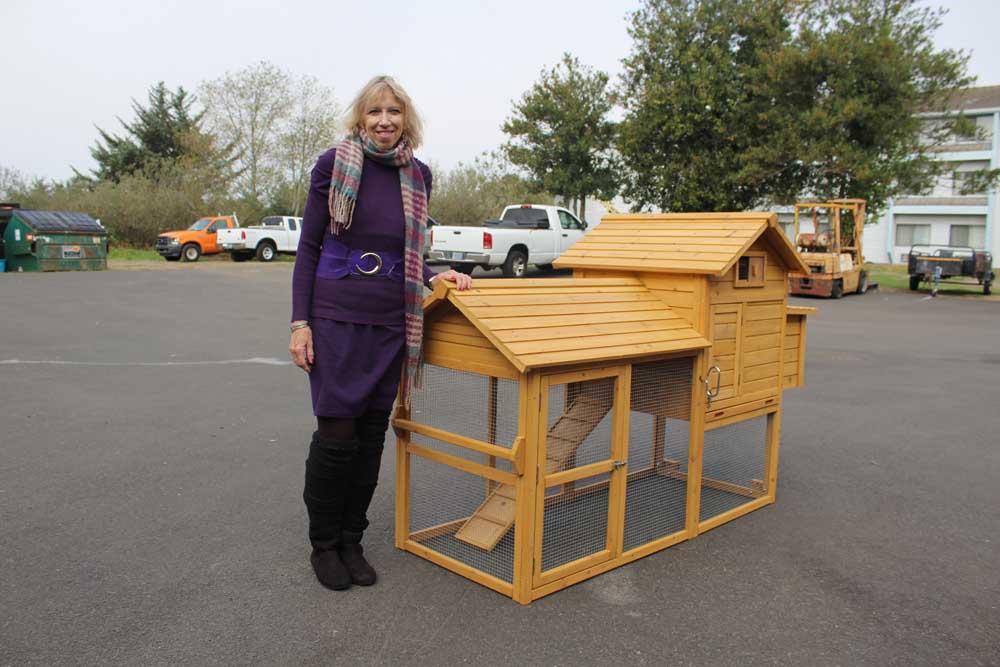Latest Seaside lodging plan is ‘for the birds’
Published 5:12 am Monday, October 12, 2015

- Jennifer Barrett, owner of Hens' Lodging Inc. Barrett advocates for the city to incorporate chicken tractors, or other movable, bottomless structures, suitable for about four chickens, into the ordinance.
A local resident believes there is a way to allow hens inside city limits without the safety, smell, noise and neighborhood disputes.
Jennifer Barrett, towner of Hens’ Lodging Inc., petitioned Seaside City Council to amend the city’s chicken ban to make an allowance for hens, provided they are contained in chicken tractors or similar structures.
The tractor is a bottomless, movable chicken “run” and nesting construction designed for a few hens. “Incorporating this concept into the ordinance will solve any and all problems that may have been faced by the city,” she said at the Sept. 28 council meeting.
A city ordinance regulating nuisances states residents cannot keep poultry — as well as livestock, bees and other animals, except household pets — within city limits, unless authorized by City Council for educational or entertainment purposes. The ordinance has been on the books “since he can remember,” City Manager Mark Winstanley said.
Citizens have brought requests to the city asking for a change that would allow chickens, but nothing came of them, Winstanley said.
Chickens are allowed in other jurisdictions along the coast, including Astoria, Warrenton, Gearhart and Cannon Beach.
During a meeting Sept. 28, Barrett presented before City Council, sharing what she believes are the existing problems with chickens in Seaside; the concept of the chicken tractor; and the idea of her company experimenting with tractors at a few locations.
Among the existing problems, Barrett cited ground and aerial predators, from dogs and cats to hawks and eagles; chickens roosting in neighbors’ yards; chickens damaging landscaping; chickens wandering in streets; neighbors being bothered by the stench from droppings in coops or the noise; and attracting rats, raccoons or other rodents with open containers of food and water.
Chicken tractors could help solve these problems while still allowing residents to keep chickens as pets or a source of nutrition, Barrett said. Chicken tractors contain the hens and are impenetrable, protecting chickens from both ground and aerial predators. Barrett proposed only allowing hens, which addresses the noise problem.
The structures are bottomless, so droppings go to the ground, and hens scratch it into the ground, tilling and fertilizing soil. Upon moving the tractor to the next area, the ground under the tractor is ready to plant, if so desired, Barrett said. Because they are safe from predators and have semi-free range — within the confines of the movable coop — the chickens tend to be happier.
“They are free to do what they enjoy,” she said.
Through her company, Barrett would like to place two tractors within city limits to experiment and demonstrate the use of the chicken tractor concept. One tractor would be placed at the Seaside American Legion Post 99 park area, where the Seaside Farmers Market occurs. The American Legion agreed to the idea, as long as the city approves. The second location would be at the Railroad Park Community Garden near U.S. Highway 101.
The chicken tractor concept, Barrett told City Council members, “will make it possible for citizens of Seaside to enjoy chickens.”
Additionally, it may encourage more people to use their yard space for growing gardens. Barrett feels the country is not in a state where citizens “can afford luxury right now, and lawns are a luxury.” Communities should focus on “the idea of feeding each other and feeding ourselves,” she said. Chickens can lay the groundwork for personal gardens is a step in the right direction.
Her company, Hens’ Lodging Inc., is a wholesale distributor of chicken tractors and similar movable coops. Whether people purchased structures from her, another distributor or built them personally, she advocates their use.
“The concept is the best way to have chickens in your backyard,” she said. “There are just so many pluses about it.”
The council members did not discuss the ordinance or Barrett’s petition at the meeting after her presentation. Unless City Council requests an ordinance change or decides to further the conversation, it will not be discussed at a future meeting, Winstanley said.
“At this point, no one has said anything to me,” he said.





